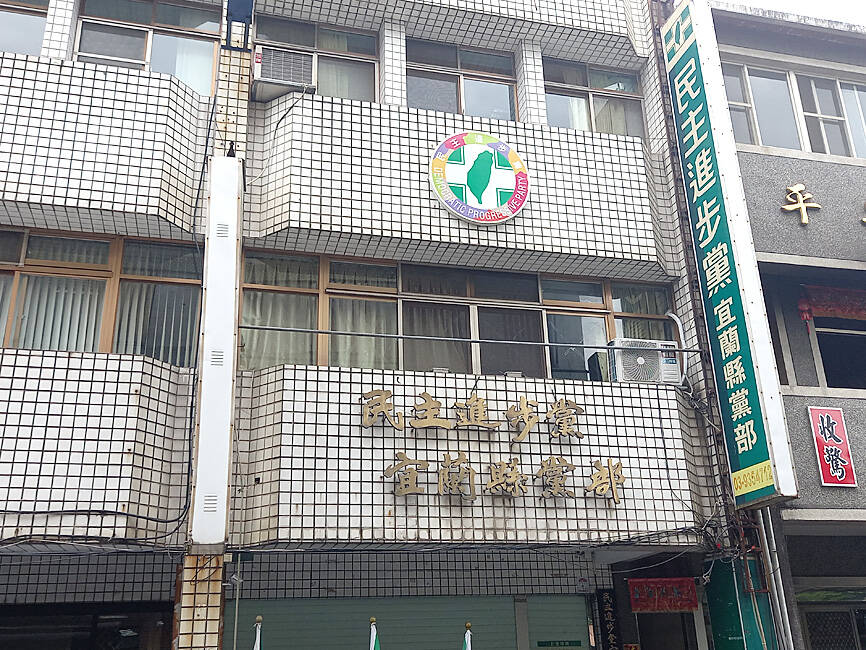The Democratic Progressive Party (DPP) must implement thorough background checks when hiring office staff and appointing officials, party lawmakers said on Sunday after a member was detained on spying allegations a day earlier.
Ho Jen-chieh (何仁傑) is being held incommunicado on suspicion of spying for China during his tenure as assistant to then-minister of foreign affairs Joseph Wu (吳釗燮). The DPP’s Yilan chapter on Sunday expelled Ho.
Ho is the latest DPP figure to be implicated in an espionage probe. Other DPP members accused of being involved in national security breaches include Presidential Office consultant Wu Shang-yu (吳尚雨), former DPP staff member Chiu Shih-yuan (邱世元) and Huang Chu-jing (黃取榮), an assistant to a New Taipei City councilor.

Photo: Chiang Chih-hsiung, Taipei Times
Last month, Sheng Chu-ying (盛礎纓), a former assistant to several DPP lawmakers — including former legislative speaker You Si-kun — was released on bail, as authorities continue investigating allegations that he was recruited by Chinese intelligence during a trip to China.
“We must take these incidents as a warning that our party was not vigilant in observing loopholes in national security... The DPP must bolster checks when recruiting and appointing staff,” DPP caucus executive director Rosalia Wu (吳思瑤) said.
“When hiring aides and office assistants, we must consider the person’s professional training, passion and interest in the job, and identification with Taiwanese consciousness. The recent incidents show that we must be more alert and must close these loopholes,” she said.
The DPP lacks regulations and an oversight mechanism on hiring office staff for legislators, Wu said, adding that there are more comprehensive laws governing appointment of officers for administrative jobs and for aides and secretaries for government ministries, including the Public Functionary Service Act (公務員服務法), the Classified National Security Information Protection Act (國家機密保護法) and amendments to the Cyber Security Management Act (資通安全管理法).
DPP Legislator Chen Kuan-ting (陳冠廷) said that office staff and assistants working for legislators are contract workers and are not vetted for security clearance under the Public Functionaries Appointment Act (公務人員任用法) or the National Intelligence Service Law (國家情報工作法).
Chen suggested amending the law to set up a more comprehensive mechanism that applies across all government agencies and enable detailed background checks when hiring legislative office staff and appointing officers to government ministries.
He said the vetting process for security should include their financial history, records of exits and visits to other countries, and criminal offenses and convictions, to prevent security breaches and lower risks of recruitment by China for spying.
Lower-ranked staff also have low wages and no clear career path, making them more susceptible to being enticed by monetary rewards from China to work as spies, a DPP member who declined to be named said.
Some of the recent incidents involved senior-level aides to key party figures, and they should have been monitored by the Ministry of Justice Investigation Bureau under the Regulations on Special Checks of Civil Servants Involved in National Security or Significant Interest (涉及國家安全或重大利益公務人員特殊查核辦法), but this was not done, the person said, adding that the party must re-evaluate the way it hires legislative staff.
Per the instructions of President William Lai (賴清德), in his capacity as DPP chairman, the DPP is considering setting up an “urgent financial need assistance program” for party employees to provide subsidies when they experience financial difficulties to prevent China from taking advantage of the situation to recruit spies, the person said.

Taiwan is stepping up plans to create self-sufficient supply chains for combat drones and increase foreign orders from the US to counter China’s numerical superiority, a defense official said on Saturday. Commenting on condition of anonymity, the official said the nation’s armed forces are in agreement with US Admiral Samuel Paparo’s assessment that Taiwan’s military must be prepared to turn the nation’s waters into a “hellscape” for the Chinese People’s Liberation Army (PLA). Paparo, the commander of the US Indo-Pacific Command, reiterated the concept during a Congressional hearing in Washington on Wednesday. He first coined the term in a security conference last

A magnitude 4.3 earthquake struck eastern Taiwan's Hualien County at 8:31am today, according to the Central Weather Administration (CWA). The epicenter of the temblor was located in Hualien County, about 70.3 kilometers south southwest of Hualien County Hall, at a depth of 23.2km, according to the administration. There were no immediate reports of damage resulting from the quake. The earthquake's intensity, which gauges the actual effect of a temblor, was highest in Taitung County, where it measured 3 on Taiwan's 7-tier intensity scale. The quake also measured an intensity of 2 in Hualien and Nantou counties, the CWA said.

The Overseas Community Affairs Council (OCAC) yesterday announced a fundraising campaign to support survivors of the magnitude 7.7 earthquake that struck Myanmar on March 28, with two prayer events scheduled in Taipei and Taichung later this week. “While initial rescue operations have concluded [in Myanmar], many survivors are now facing increasingly difficult living conditions,” OCAC Minister Hsu Chia-ching (徐佳青) told a news conference in Taipei. The fundraising campaign, which runs through May 31, is focused on supporting the reconstruction of damaged overseas compatriot schools, assisting students from Myanmar in Taiwan, and providing essential items, such as drinking water, food and medical supplies,

New Party Deputy Secretary-General You Chih-pin (游智彬) this morning went to the National Immigration Agency (NIA) to “turn himself in” after being notified that he had failed to provide proof of having renounced his Chinese household registration. He was one of more than 10,000 naturalized Taiwanese citizens from China who were informed by the NIA that their Taiwanese citizenship might be revoked if they fail to provide the proof in three months, people familiar with the matter said. You said he has proof that he had renounced his Chinese household registration and demanded the NIA provide proof that he still had Chinese